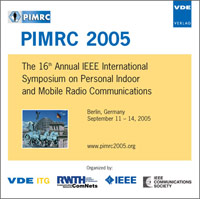An Adaptive MAC Protocol for MC-CDMA Adhoc Wireless LAN
Konferenz: PIMRC 2005 - 16th Annual IEEE International Symposium on Personal Indoor and Mobile Radio Communications
11.09.2005 - 14.09.2005 in Berlin, Germany
Tagungsband: PIMRC 2005
Seiten: 8Sprache: EnglischTyp: PDF
Persönliche VDE-Mitglieder erhalten auf diesen Artikel 10% Rabatt
Autoren:
Orfanos, Georgios; Walke, Bernhard; Butsch, Willi (ComNets, RWTH Aachen University, Germany)
Reumerman, Hans-Jürgen (Philips Research Laboratories, Aachen, Germany)
Inhalt:
Multi-Carrier Code Division Multiple Access (MC-CDMA), a novel, high capacity, multicarrier modulation scheme, is developing to a key radio transmission technology for future Wireless Local Area Networks (W-LANs). However in adhoc Code Division Multiple Access (CDMA) networks near-far effects can block a receiver due to high interference. These effects occur when a receiving station is closer to an interferer than to its corresponding transmitter. Accordingly, the receiver cannot detect the intended signal out of the received one and the data transmission fails. In this work, we present an adaptive Medium Access Control (MAC) protocol for adhoc MC-CDMA based W-LANs, based on the IEEE 802.11 MAC protocol. The new protocol has the ability to overcome the near-farproblem by employing a frequency adaptation method. The key of the proposed method is an interference estimate built at each receiving Mobile Station (MS). Aided by its estimate, a MS can calculate whether the Quality of Service (QoS) expectations of the incoming link can be accomplished. If the interference is too high, the receiving MS initiates a frequency channel change and informs the corresponding transmitter over the control packets about the Id of the new channel. It is shown that this concept can deploy the high capacity characteristics of MC-CDMA in wireless environments.


